Bugs of War
How I have got used to them
In fall of 1936 my family moved in a large house in Krezmina Street in central part of Osijek City. It was a free standing dwelling with a small garden behind it. Mother bought a puppy of a black Doberman with red-brown markings in spring of 1937. The young bitch's name was PEGGY that became my nickname soon after. Thus domestic fleas moved into our house but one could keep them under control with chrysanthemum insect-powder. Also mother controlled Peggy regularly looking after any flea the very moment it started scratching itself.
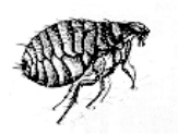 |
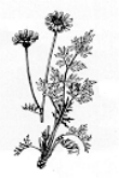 |
| A human or dog flea. | Chrysanthemum flower has strong insecticide piretrin. |
Late October of 1943 I was called into army service and traveled still wearing my civilian cloth in cattle-wagons of a transport in company of some1000 recruits. The voyage lasted four nights and three days and near midnight of the fourth night the transport arrived at Stockerau railway station. There we disembarked into pitch darkness and cold northerly wind blowing fiercely driving the rain almost horizontally at us tired and miserable ones. After more than an hour walk under this harsh weather condition we reached the "Senninger Lager" situated west outside of Stockerau at last. We were there drenched throughout - what ever we had on became wet so that one had the filling wetness penetrated even the skin reaching bones. We were herded into a longish strange smelling shack but it was dry and warmer there at least. One group after the other one entered a little lit room with few tables in it. We were ordered to fully undress and to wrap all belongings into a bundle except any food staff, which was all gone during that grueling and long transport.
Stark naked and shivering we moved into another room where each one had to pass a medical examination carried out by tough looking paramedics. They checked thoroughly by pulling at hairs on heads, in armpits and at genitals. After that procedure everyone got a palm full of an awfully smelling liquid soap. Thus we passed our first check-up for body and hair lice! We had to be moving on and entered a shower room where commands blared from loudspeakers: "Soap yourself thoroughly from head to toes! You have 3 minutes do make it!" Soon after sprinklers started spraying streams of hot water engulfing us in a steam mist that made us blind. One had to close eyes anyway because soap foam was hurting too.
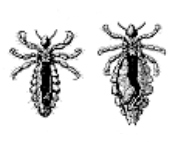
White louse male at left and female one at right.
After a while sprinklers stopped and another door opened and from loudspeakers yelled: "Go there instantly!" That new room was warm and vented by dry steam so that our wet bodies were dry within few minutes. Soon we had to leave it for the next one with tables but it was much cooler here making us shivering and goose fleshing. There we waited for our bundles, which arrived with vapor still evaporated from them. We dressed into the warm clothing but our footwear remained wet as before. It was rather unpleasant to leave warm rooms of the "Entlausungsstation" (= anti-lice shack) and get out into night's coldness and wetness for a shorter walk again. In company of my comrades I entered in one of the several darkened and cold shacks. At the entrance everyone received two thin blankets and were ordered to go to the only longish room in which rows of bunk beds stood along walls. I'd selected the closest and free one with a blank straw-filled mattress in it. I took of my wet footwear of and wrapped myself into the blankets to keep cloths warmness as long as possible. Soon I was asleep in a strange bed in a very cold room in which some dozens of bodies snored already. I slept like a hog until the next day's late morning call. No wonder - we all were so very tired after four nights of sleeping on cattle-wagon's floor.
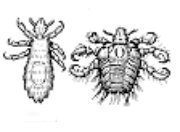
Grey lause at left and at right the one found at privy parts.
Several months later our group of twenty recruits was attending a lecture in a room at the "Jaeger Kaserne" (= Hunter's barracks) in Stockerau. We came here to be trained for artillery officers and had advanced to corporals already. During one of the lectures a paper was handed from hand to hand landing in front of the officer in charge. Within a pencilled round "boundary" on this paper there was something creeping around. The officers stared at it for a moment and astound shouted: "It's a louse! Lice! Who has lice in your room?" The result of this dramatic event turned into a case of emergency in the barracks. Few days later we had to bundle up all our belongings (except food staff) and marched of to the railway station. We had free wagon for us at once when few passengers there learned about the dangerous bugs we were carrying in our bundles. The "Entlausungsstation" at Vienna's West railway station was our destination where we underwent the same procedure as described before.
Before leaving we had to remove straw-filled mattresses from our beds and bringing them to the yard took out the straw filling that was burned afterwards. We left the empty mattresses in our room then after which all windows and door had been sealed off. In the room wardrobes were left open and furniture including some soldier's metal equipment remained there too. Later several rooms were disinfected with gas to get rid of bedbugs that one could be found in old buildings often. I knew about the existence of bedbugs and that sting is rather nasty as experienced during my first night duty as sergeant-in-charge.
The night duty room was next to staircase and there was just place for a bed and a table with a chair in front of the only window. An open bulb scarcely lit this ward but a large candle was on the table in case electricity failure. Next to the door was a narrow wardrobe for cloths and arms of two charges on night duty. One of them could rest on the bed but had to get up when his comrade went out on hourly rounds. With time progressing bedbugs felt the human body's heat and crept out of the many crevices in this old building.
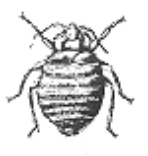
Bed bug or also known as house bug.
After a while it became impossible to lay on bed so both charges preferred sitting at the table. The bedbugs found the position of human radiation fast, climbed up wall and crept on ceiling to fall down straight onto the radiation source. A genius contrived a simple method how to catch the "parachuting" bugs and had put a helmet upside down, filled little water in and placed it next to the burning candle. The candle's flame attracted bedbugs to the ceiling above heat source from where they parachuted straight into the helmet. The charge's new duties were picking out bedbugs from the helmet and fry them dead on candle's flame. Had anyone smelled "fried" bedbugs ever? Bedbugs alone smell awfully but fried ones is much worse. The room disinfected with gas became more homely afterwards and demand for candles diminished too. We left the "Jaeger Kaserne" in October 1944 for good.
I was seconded to a Howitzer-gun battery as lieutenant-junior late in December 1944. Battery was at front line in Osijek and was involved in several battle engagements until it started its retreat from Osijek westwards on April 13, 1945. A week after the Armistice I led Battery's soldiers into surrender to Tito's Yugoslav army early morning of May 15th. Two days later some 40.000 of POW started the deadly march eastwards from a temporary camp at Slovenjgradec (Slovenia). I did survive it marching barefooted some 500-km despite inhuman treatment and without food and returned to Osijek on June 2nd totally physically exhausted and mentally disillusioned. I couldn't wash or clean myself for some 6 weeks and was dressed in rags only. Sure bugs invaded my body but I haven't noticed them as long as I was fighting for my bare life.
I'd notice immediately lice are creeping around most sensitive body parts when staying longer at one place say in a yard or on a grassy plane. I've wondered how can a louse find its way to my skin, which was covered with a crust of dirt cracking when moving or sweat dissolving it slightly. It was a standard daily routine checking seam in ragged cloths by scratching out everything what looked like a louse or a bug including eggs and maggots. The seams were places where all kinds of bugs had a good breeding place due to body's humidity and warmness. For me it became obsession doing this bug's extermination at any time particularly when lice retreated to their in-seam-homes at mornings. I got the first chance to have a proper bath and change clothes at home in Osijek on June 12th on my way to the prison. It was my 20th birthday and resurrection to a new life.
After some 8 weeks of living in dirt this thorough cleaning produced a short respite of bugs of war though. As I was not able to shave off fully my hair and beard so body lice had breeding places there. During next 8 weeks my unpleasant companions have returned in full splendor. The routine of cleansing cloth seams helped me through times I'd spent in various prison rooms and in open POW's campgrounds until my imprisonment ended. On August 15th 1945 I returned home for good and discarded all clothes that were burned instantly. I indulged my body to a long washing procedure, the hair was cut short and beard shaved off too. Only then I got read of the pestilence of bugs of war.
Epilogue: A year later I've volunteered for a 2 months work as member of the 1st Students shock-working brigade at the construction of a new railway line Brcko - Banovici. On arrival there I had been "treated" with several blast of DDT powder although I was very clean of bugs. Such is the life! Take care not to get the acquaintance with this pestilence.